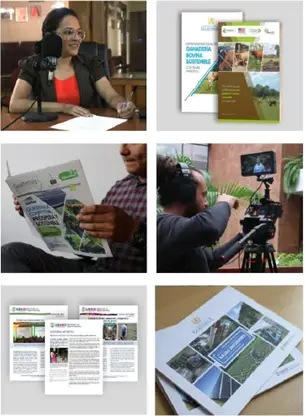Addressing the impacts of climate change is as much of a local issue as it is a global issue. Individual behaviors play a vital role in shifting the mindset of the general population towards adopting behaviors that can sustainably and indefinitely limit global warming. Implementing social and behavior change communication (SBCC) campaigns can change behaviors, perceptions, attitudes, and beliefs on a range of issues like environmentally friendly practices, clean energy development, and investing in natural resources. It is a tool that can help advance and sustain climate adaptation and mitigation efforts.
During the “Communicating Urgency: Social and Behavior Change in the Era of Climate Change” webinar (full video), hosted by Springboard in September, I spoke about RTI’s efforts supporting USAID-funded SBCC campaigns aimed at influencing public perceptions to reduce greenhouse gas (GHG) emissions and protect wildlife. RTI successfully implemented two social and behavioral change communication approaches in Guatemala and Southeast Asia that demonstrated how targeted communication campaigns can influence decision makers and direct a specific audience to shift behaviors that negatively impact conservation efforts.
Reducing greenhouse gas emissions in Guatemala
The USAID-funded Low E
 mission Development (LEDS) project worked with the Government of Guatemala to create the country’s first low emission development strategy. Since its launch in 2019, this strategy has been one of the cornerstones of Guatemala’s climate mitigation planning, helping to bridge long-term climate goals with economic growth objectives.
mission Development (LEDS) project worked with the Government of Guatemala to create the country’s first low emission development strategy. Since its launch in 2019, this strategy has been one of the cornerstones of Guatemala’s climate mitigation planning, helping to bridge long-term climate goals with economic growth objectives.
LEDS launched an SBCC campaign to highlight the benefits of low emissions at events like trade fairs, government events, and on the radio. It engaged with local stakeholders to understand their perspectives on climate change and to create messages that would resonate with them. The goal was to influence public perception across the general population to support low emission policies, decrease Guatemala’s carbon footprint, and to support counterparts in government, private business, and civil society to strengthen the effectiveness of their own climate-related communications and social engagement strategies.
Guatemalan SBCC campaign results
As a result, LEDS worked with eight government ministries and over 25 businesses to generate evidence and communicate the benefits of climate change mitigation and low emission development, working across economic sectors such as agriculture, energy, transportation, forest management, and industry. Over 250 participants attended the public launch of the National Low Emission Development Strategy, which was recently used to updated Guatemala’s Nationally Determined Contribution under the Paris Agreement.
[Read more about lessons from engaging the private sector in climate change planning]
Using SBCC campaigns to protect wildlife in Thailand
The connection between wildlife and climate change is not always apparent, but wildlife trafficking and the illegal trade of natural resources can undermine climate change adaptation efforts and cost countries millions, in addition to threatening national security and an economy’s stability and growth.
Many communities, particularly those that are marginalized, rely on the biodiversity of the ecosystems in which they live to increase their resilience to weather conditions such as severe drought or flooding. Nature-based solutions or landscape-based approaches to combat climate change increase biodiversity, promote sustainable land-use, protect animal populations, and support climate mitigation efforts.
To address these adverse effects, the USAID Wildlife Asia project, led by RTI, worked to reduce illegal trafficking of elephant ivory, rhino horn, tiger, and pangolin products in Southeast Asia. The project drew on the success that SBCC has had in the health sector and, for the first time, used social and behavior change communication for the purposes of biodiversity conservation. Through formative research, the project used a socio-ecological model, developed by the USAID Communication for Change project, and adapted to demand reduction to identify target audiences interested in or seeking out illegal animal parts and products to reduce consumer demand for these illegal products across China, Thailand, and Vietnam.
Decreasing the appeal of ivory
For example, in Thailand, the project used creative messaging to target current or potential consumers of ivory products through the Beautiful Without Ivory campaign. The campaign used fashion influencers and targeted ads to decrease the perceived beauty of ivory, which is one of the main reasons ivory is popular among Thais, especially urban, well-educated women over 20 years old.
Beautiful Without Ivory Campaign messages. Credit: USAID Wildlife Asia
The campaign, which started in late 2019, ran three rounds of campaign ad placements in fashion magazines, social media, and billboards in malls and metro stations. The total estimated views of the campaigns were more than 20 million people. As a result, a survey showed that those who agreed with “Ivory helps make one feel beautiful” reduced from 67 percent in 2018 to 48 percent in 2020. When it came to changing behaviors, respondents who stated that they would buy ivory products in the future decreased from 79 percent in 2018 to 37 percent in 2020. The campaign received high saturation levels as well, with over one-third of survey respondents seeing campaign ads three or more times.
Ads target potential buyers of illegal animal products
The USAID Wildlife Asia project also ran a digital deterrence campaign in Thailand that used digital marketing to target people specifically searching for illegal animal parts and products online. Ads, like the ones below, appeared when sensitive keywords were used. The ads shared messages informing the interested buyer of the legal repercussions of purchasing these items. The ads were served to 560,670 searches and resulted in 17,410 clicks to the landing page. On social media, the ads were viewed over 8 million times.
Don't buy bad luck
Can you afford the fines?
Digital deterrence campaign ads. Credit: USAID Wildlife Asia
Combating wildlife trafficking with social and behavioral change communication campaigns
The USAID Wildlife Asia project was not just focused on biodiversity, it was designed to support transboundary coordination (with law enforcement and policy, for example) to combat wildlife trafficking. The success of this approach resulted in the development of USAID’s SBCC Demand Reduction Guidebook, which is considered as best practice in the countering wildlife sector. The work is continuing under the USAID Reducing Demand for Wildlife project, which is currently being implemented by RTI.
Lessons from the SBCC Webinar
The “Communicating Urgency: Social and Behavior Change in the Era of Climate Change” webinar was held because SBCC campaigns play an important role in communicating risk and promoting climate resilience and mitigation measures as the effects of climate change becomes more and more apparent. Other presenters included the George Mason Center for Climate Communication, Rare, and Meatless Mondays. A key takeaway that we learned from other presenters and from the success of SBCC campaigns in the USAID-funded LEDS, USAID Wildlife Asia, and USAID Reducing Demand for Wildlife projects, is that we need to continue to find opportunities to leverage SBCC methods to enhance climate resilience efforts to help countries adapt and mitigate climate change.
Learn more about our environment and energy work, and our Center for Climate Solutions.





